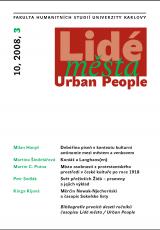Debóřina píseň v kontextu kulturní antinomie mezi městem a venkovem
DOI:
https://doi.org/10.14712/12128112.3686Klíčová slova:
Judges 5, verbal feud, Canticle of DeborahAbstrakt
The article treats G. P. Miller’s interpretation of the Canticle of Deborah (Judges 5), here enriched by several other hidden motives and developed upon the possible historical context of the main part of the song. Miller interprets the Canticle of Deborah as a part of the cultural antinomy between cities and the countryside. The gist of this interpretation is that the Canticle of Deborah is a result of the specific social institution of verbal feuds. A verbal feud is a type of feud that is based on slander, on defamation, on evil-speaking, on false tales of dishonour and impurity about the other communities and on boasting of one’s own advantages and superiority. Therefore, a verbal feud is thought to be a kind of struggle for higher status positions, which is understandable in a society where the main social stratification pattern consists of the norms of honour and dishonour. Miller sees the Canticle of Deborah as a literary riposte form, that is, as a form of retaliation against an insult circulated in society by the rival group. In the next part of the study, the interpretation is develops the possible historical context of the Canticle, placed at the turn of the Bronze and Iron Ages during the 12th and 11th centuries B.C. Miller’s analysis of the Canticle of Deborah as a riposte seems to be compatible with what has been reconstructed by archaeological excavations, and is therefore accepted. It is claimed, however, that it cannot be plausible for the Canticle as a whole, because of the different signs and facts connected to different historical contexts mentioned in verses 14-18. Therefore, I propose that the original riposte form of the presumably oral material was later – during the integrative efforts shortly before the state of Northern Israel was fully formed – compiled by a northern Israelite author who added or fully retrojected verses 14-18. Nevertheless, C. Levin’s argumentation based on the philological evidence dating the song to the second part of the first millenium B.C. is not denied here, but is developed from a presumably older cultural context, which could foster the song in its oral form.
Stahování
Publikováno
Jak citovat
Číslo
Sekce
Licence

Tato práce je licencována pod Mezinárodní licencí Creative Commons Attribution-NonCommercial-NoDerivatives 4.0.


